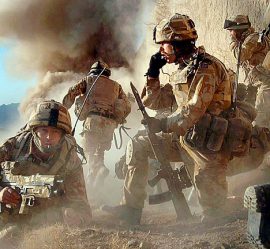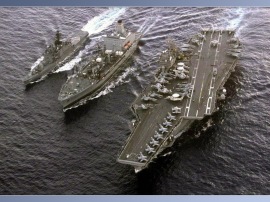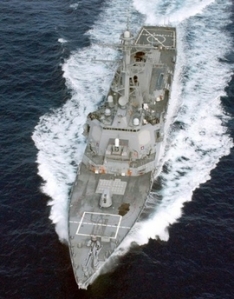Operation New Dawn: U.S. Engaged in Combat in Iraq
September 2, 2010
Note: Yet another “Mission Accomplished” for the U.S. led war in Iraq. This time, Barack H.Obama is the flag pole from which the people in the United States and the rest of the world see the deceit waving in front of them. Combat is not over, combat troops are still there.
AP
Even as President Barack Obama was announcing the end of combat in Iraq, American soldiers were sealing off a northern village early Wednesday as their Iraqi partners raided houses and arrested dozens of suspected insurgents.
While the Obama administration has dramatically reduced the number of troops and rebranded the mission, the operation in Hawija was a reminder that U.S. forces are still engaged in hunting down and killing al-Qaida militants — and could still have to defend themselves against attacks.
That reality was front and center at a change-of-command ceremony in one of Saddam Hussein’s former palaces outside Baghdad that the American military now uses as its headquarters. Officials warned of a tough road ahead as the U.S. moves into the final phase of the 7 1/2-year war.
Of paramount concern is Iraqi leaders’ continued bickering, six months after parliamentary elections, over forming a new government — a political impasse that could further endanger stability and fuel a diminished but still dangerous insurgency.
“Iraq still faces a hostile enemy who is determined to hinder progress,” Gen. Lloyd Austin, the newly installed commander of the just under 50,000 U.S. troops still in Iraq, told the swelling crowd that was clad in military fatigues and political suits. “Make no mistake, our military forces here and those of the Iraqi nation remain committed to ensuring that our friends in Iraq succeed.”
Vice President Joe Biden presided over the gathering at al-Faw palace, Saddam’s gaudy former hunting lodge replete with fake marble walls and a huge chandelier made of recycled plastic.
The remaining U.S. forces in Iraq would be “as combat ready, if need be, as any in our military,” Biden said, flanked by Defense Secretary Robert Gates and Joint Chiefs Chairman Adm. Mike Mullen for the 75-minute ceremony, which also changed the U.S. mission’s name from “Operation Iraqi Freedom” to “Operation New Dawn.”
Three years ago, about 170,000 U.S. troops were in Iraq. Of those who remain, fewer than 10 percent — or 4,500 — are special forces who will regularly go on raids and capture terrorists, albeit alongside Iraqi troops.
Obama ordered the end of combat missions by Aug. 31 in a step toward a full withdrawal of American forces by the end of next year that was mandated in a U.S.-Iraqi security agreement.
Violence also has declined dramatically since early 2007, when the Pentagon poured tens of thousands more troops into Iraq over a matter of months to quell a Sunni insurgency that had lured the country to the brink of civil war. Additionally, a Sunni revolt against al-Qaida in Iraq and a Shiite militia cease-fire have helped tamp down attacks, although bombings and shootings across Iraq continue on a near-daily basis.
But Iraqi forces are heavily dependent on U.S. firepower, along with helicopters, spy data and other key tools for combating terrorists that they won’t be able to supply on their own for years to come.
“Every soldier I have knows that fighting is not over because there are groups here that still want to hurt us,” Maj. Gen. Tony Cucolo, commander of U.S. troops in Iraq’s volatile north, told The Associated Press recently. “But clearly combat operations is not in our mission statement.”
In Hawija, once a hub for Sunni militants and Saddam’s disaffected allies located 150 miles north of Baghdad, roughly 80 U.S. soldiers teamed up with more than 1,000 Iraqis to arrest about 60 terror suspects in the early morning raid Wednesday.
From checkpoints and command centers to helicopters hovering overhead, the Americans were on hand at the request of Iraqi police. But it was the Iraqis who went into houses and arrested suspected insurgents — including two considered high-value targets — while the U.S. watched the operation from afar.
Hours before the raids, Lt. Col. Andy Ulrich gave his soldiers a pep talk to counter concerns they weren’t on a worthwhile mission.
“You all are combat troops not doing a combat mission, although it looks smells and feels and hurts a lot like combat,” Ulrich said.
“Don’t worry about what the politicians are saying because we have a mission,” he added. “The bad part is, we can’t go kicking the doors ourselves and get these guys. We’ve got to kind of convince Iraqis to do it, but the good part is, they’re kind of willing to do it.”
Iraqi forces across Baghdad appeared to be on heightened alert, aiming to reassure the populace and ward off insurgent attacks to coincide with the change in command.
Intelligence officials had warned al-Qaida in Iraq might use the U.S. military’s shifting mission to launch suicide bombings around the capital in the days leading up to Wednesday’s ceremony. However, the day was relatively quiet, except for a roadside bomb in eastern Baghdad that police said killed one person.
At the Baghdad ceremony, Gen. Ray Odierno, the outgoing commander, formally ended his nearly five-year tour in Iraq on a reflective note.
“This period in Iraq’s history will probably be remembered for sacrifice, resilience and change,” Odierno said. “However, I remember it as a time in which the Iraqi people stood up against tyranny, terrorism and extremism, and decided to determine their own destiny as a people and as a democratic state.”
Then, wistfully using his military call sign one last time, Odierno ended his remarks: “Lion 6 — out.”
Obama ordered the refocusing of the U.S. mission last year to fulfill a campaign promise of ending what he once termed “a dumb war” and one that Gates acknowledged Wednesday was launched without justification. In an address Tuesday night Obama announced the end of American combat, but made clear that this was no victory celebration.
“Of course, violence will not end with our combat mission,” the president said.
Defining the front lines in a war where soldiers who are attacked while delivering supplies could just as easily return fire as Marines while on a raid to round up suspected insurgents has never been easy. Some of the key ongoing threats to the safety of American forces are the same as they’ve always been: rockets, mortars and roadside bombs.
U.S. military officials have said Iranian-backed militias are stepping up their attacks against targets in Baghdad, trying to make it look like they’re driving out the Americans. Since arriving in Iraq, the battalion taking part in the Hawija raids has been hit by rocket and grenade attacks on their patrols and on their base almost every other day.
In the western Iraqi city of Ramadi before the ceremony, Gates told reporters the U.S. would consider keeping some military forces in place past next year, if the Iraqi government requests it.
Asked whether the U.S. was still at war in Iraq, Gates answered succinctly, “I would say we are not.”
He was less definitive about whether the 7 1/2-year war was worthwhile. More than 4,400 American troops and an estimated 100,000 Iraqis have been killed since the 2003 invasion, and billions of dollars have been poured into the war effort.
Claiming that Saddam had weapons of mass destruction, then-President George W. Bush ordered the invasion with approval of a Congress still reeling from the 9/11 attacks. Bush’s claims were based on faulty intelligence, and the weapons were never found.
“The problem with this war, I think, for many Americans, is that the premise on which we justified going to war turned out not to be valid,” Gates said. “Even if the outcome is a good one from the standpoint of the United States, it’ll always be clouded by how it began.”


